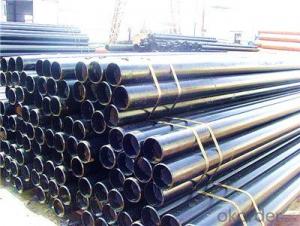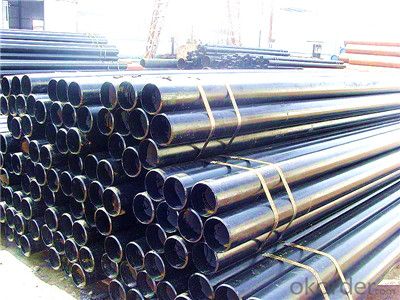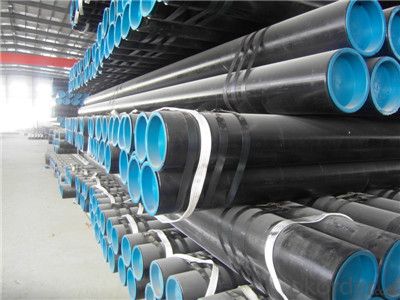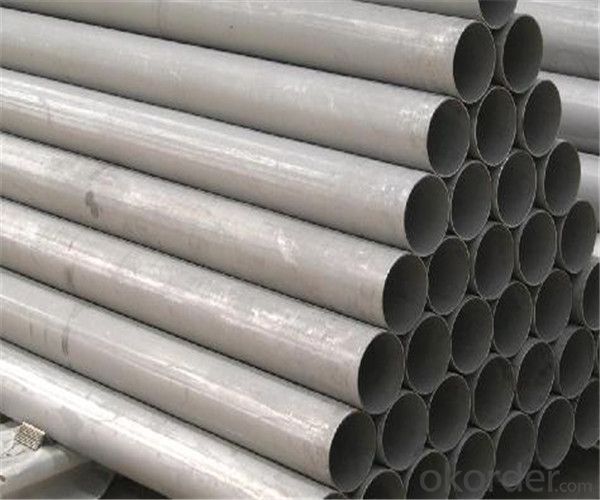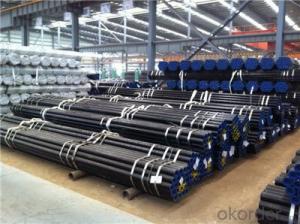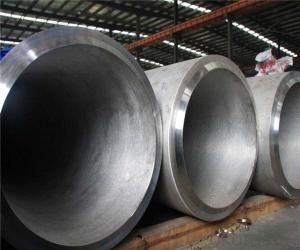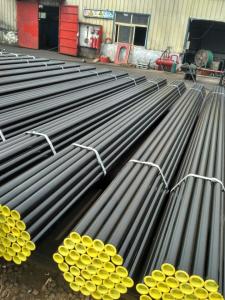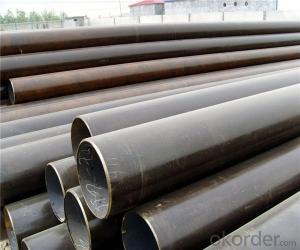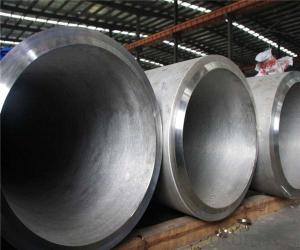High Quality Seamless Steel Pipe with Low Price from CNBM
- Loading Port:
- Tianjin
- Payment Terms:
- TT OR LC
- Min Order Qty:
- 100 m.t.
- Supply Capability:
- 200000 m.t./month
OKorder Service Pledge
OKorder Financial Service
You Might Also Like
PRODUCT DETAILS
1.Structure of Seamless Steel Pipe Description:
A large amount of Seamless Steel Pipes is offered to the clients at cost effective rates. These pipes are extremely durable, resistant to corrosion and have high tensile strength. Our pipes are used in nuclear plants, power plants, refineries and construction industry across the country. Furthermore, we are capable of providing these seamless pipes to the clients in bulk quantity.
2.Main Features of the Steel Pipe:
• High manufacturing accuracy
• High strength
• Small inertia resistance
• Strong heat dissipation ability
• Good visual effect
•Reasonable price
3.Packaging & Delivery:
| Packaging Details: | Seaworthy packages, bundles wrapped with strong steel strip |
| Delivery Detail: | 15-30 days after received 30% TT |
4.Seamless Steel Pipe Specification:
| Standard: | GB, DIN, ASTM,ASME, ASTM A106-2006, ASTM A53-2007 |
| Grade: | 10#,20#, 45#, 16Mn |
Thickness: | 8 - 33 mm |
| Section Shape: | Round |
| Outer Diameter: | 133 - 219 mm |
| Place of Origin: | Shandong, China (Mainland) |
| Secondary Or Not: | Non-secondary |
| Application: | Hydraulic Pipe |
| Technique: | Cold Drawn |
| Certification: | API |
| Surface Treatment: | factory state or painted black |
| Special Pipe: | API Pipe |
| Alloy Or Not: | Non-alloy |
| Length: | 5-12M |
| Outer Diameter: | 21.3-610mm |
5.Product pictures
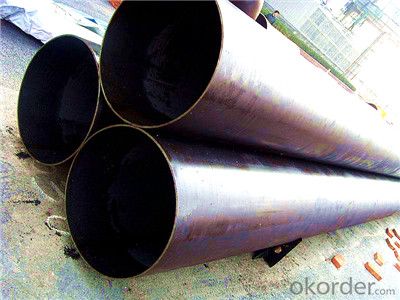
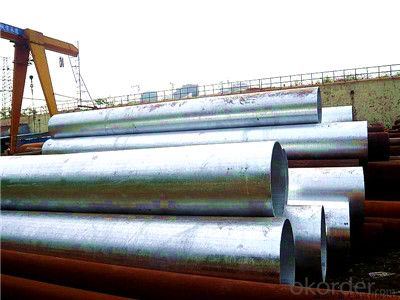
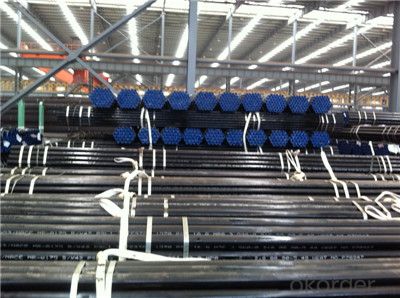
5.FAQ of Seamless steel pipe:
①How is the quality of your products?
Our products are manufactured strictly according to national and internaional standard, and we take a test
on every pipe before delivered out. If you want see our quality certifications and all kinds of testing report, please just ask us for it.
Guaranteed: If products’ quality don’t accord to discription as we give or the promise before you place order, we promise 100% refund.
②How about price?
Yes, we are factory and be able to give you lowest price below market one, and we have a policy that “ for saving time and absolutely honest business attitude, we quote as lowest as possible for any customer, and discount can be given according to quantity”,if you like bargain and factory price is not low enough as you think, just don’t waste your time.Please trust the quotation we would give you, it is professional one.
③Why should you chose us?
Chose happens because of quality, then price, We can give you both.Additionally, we can also offer professional products inquiry, products knowledge train(for agents), smooth goods delivery, exellent customer solution proposals.Our service formula: good quality+good price+good service=customer’s trust.
SGS test is available, customer inspection before shipping is welcome, third party inspection is no problem.
Any question, pls feel free to contact us !
- Q: What are the environmental benefits of using steel pipes?
- Steel pipes have several environmental benefits. Firstly, steel is a highly durable material, which means that steel pipes have a longer lifespan compared to other types of pipes. This reduces the need for frequent replacements, ultimately reducing waste generation. Additionally, steel is 100% recyclable, making it a sustainable choice. Using steel pipes promotes a circular economy by reducing the demand for virgin materials and minimizing carbon emissions associated with extraction and manufacturing processes. Furthermore, steel pipes are resistant to corrosion, reducing the risk of leaks and minimizing environmental contamination. Overall, the environmental benefits of using steel pipes include reduced waste, lower carbon emissions, and improved resource efficiency.
- Q: How do you calculate the pipe volume for steel pipes?
- In order to determine the volume of a steel pipe, one must possess knowledge regarding its length and the inner diameter. The formula for calculating the volume of a cylindrical shape, such as a pipe, is V = πr^2h, where V denotes the volume, π represents a mathematical constant which is approximately equivalent to 3.14159, r signifies the radius of the pipe (which is half of the inner diameter), and h stands for the length of the pipe. Initially, employ a measuring tape or a caliper to measure the inner diameter of the pipe. Proceed to divide this value by 2 in order to obtain the radius. Afterwards, proceed to measure the length of the pipe, utilizing inches, feet, or meters. Ensure that the same unit of measurement is used for both the radius and length. Once the measurements for the radius and length have been ascertained, input them into the formula V = πr^2h. For instance, let us assume that the inner diameter of the steel pipe measures 10 inches and the length amounts to 50 feet. Firstly, divide the inner diameter by 2 to determine the radius: 10 / 2 = 5 inches. Next, convert the length into inches: 50 feet * 12 inches/foot = 600 inches. Subsequently, input the values into the formula: V = 3.14159 * 5^2 * 600. By calculating the volume: V = 3.14159 * 25 * 600 = 47,123.85 cubic inches. Therefore, the volume of the steel pipe is approximately 47,123.85 cubic inches.
- Q: How do steel pipes handle extreme temperatures?
- Steel pipes are designed to handle extreme temperatures due to their high thermal conductivity and resistance to heat. At high temperatures, steel pipes expand but maintain their structural integrity, preventing them from warping or weakening. Additionally, steel's low thermal expansion coefficient allows it to withstand rapid temperature changes without significant damage. Overall, steel pipes are well-suited for transporting hot or cold fluids and gases in various industrial applications.
- Q: What is the typical diameter range for steel pipes?
- The typical diameter range for steel pipes varies, but it typically falls between 1/2 inch to 48 inches.
- Q: Is steel pipe made of profiles?
- According to the shape of the cross-section, the steel is generally divided into profiles, plates, pipes and metal products in four categories.Therefore, the steel pipe belongs to the pipe, not the profile.
- Q: How are steel pipes used in the automotive industry?
- Steel pipes are commonly used in the automotive industry for various applications such as exhaust systems, fuel lines, and structural components. They provide durability, strength, and resistance to high temperatures, making them ideal for carrying exhaust gases, fuel, and providing support to the vehicle's frame.
- Q: How are steel pipes sized and classified?
- Steel pipes are sized and classified based on their outer diameter, wall thickness, and length. The sizing is done using standard measurements such as nominal pipe size (NPS) or nominal diameter (DN). Classification is determined by factors such as the pipe's pressure rating, material composition, and intended use. This helps ensure compatibility and proper installation in various applications such as plumbing, construction, and industrial processes.
- Q: 25 of the steel pipe with 6 in charge of what is the difference?
- Outer diameter representation of steel pipe:When the design is nominal diameter DN means diameter, should be nominal diameter DN and the corresponding product specifications table. Specification for unplasticized polyvinyl chloride pipes for building drainage, de (nominal outer diameter) * e (nominal wall thickness), (GB, 5836.1-92), polypropylene (PP) pipe for water supply, specifications by de * e (nominal outer diameter * wall thickness).
- Q: What is the typical lifespan of steel pipes?
- The typical lifespan of steel pipes can vary depending on various factors such as the quality of the steel used, the environmental conditions, and the maintenance and usage of the pipes. However, on average, steel pipes are known to have a lifespan of around 50 to 100 years. With proper installation, regular inspections, and appropriate maintenance, steel pipes can often exceed this lifespan and provide reliable service for several decades. It is important to note that factors such as corrosion, erosion, and external damage can impact the lifespan of steel pipes, so it is crucial to implement preventive measures and necessary repairs to ensure their longevity.
- Q: Are steel pipes resistant to chemicals?
- Yes, steel pipes are generally resistant to chemicals. However, their resistance can vary depending on the specific chemicals involved and the type of steel used. It is important to consider the chemical composition and temperature of the substances being transported, as well as any potential corrosive effects, to ensure the appropriate choice of steel pipe material.
Send your message to us
High Quality Seamless Steel Pipe with Low Price from CNBM
- Loading Port:
- Tianjin
- Payment Terms:
- TT OR LC
- Min Order Qty:
- 100 m.t.
- Supply Capability:
- 200000 m.t./month
OKorder Service Pledge
OKorder Financial Service
Similar products
Hot products
Hot Searches
Related keywords
